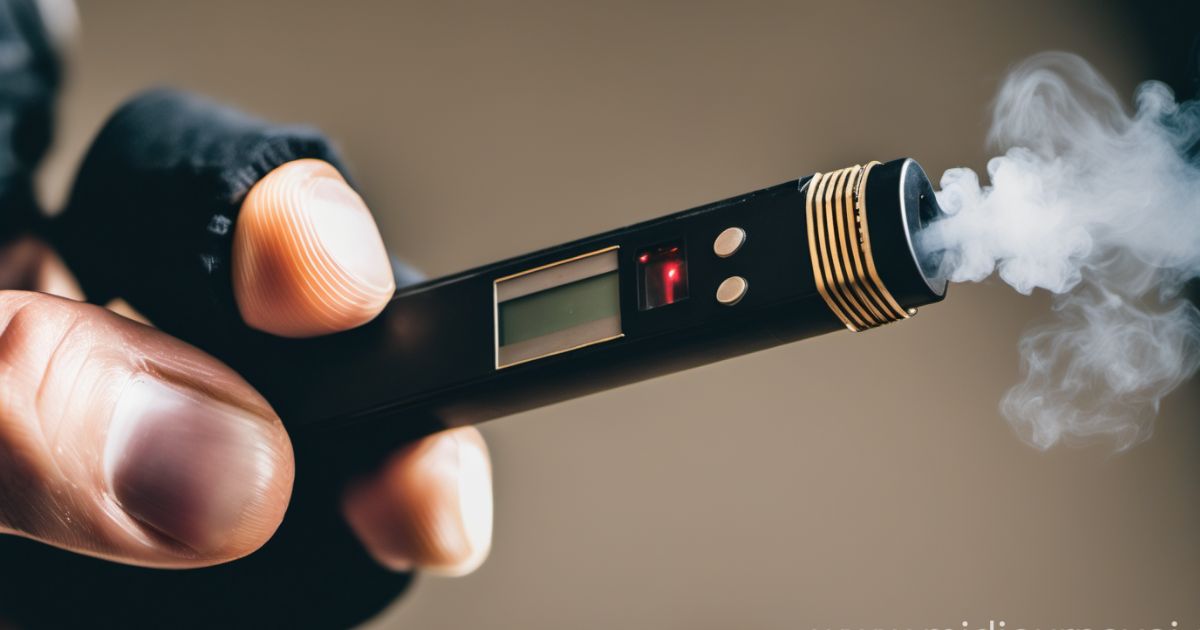When it comes to passing through a metal detector, disposable vapes pose a common concern.
These devices contain metal components like coils and lithium-ion batteries, which can trigger the detector.
While smaller vapes with minimal metal content might not always set off alarms, it’s crucial for travelers to be aware of potential detection.
Understanding the composition and sensitivity of metal detectors can help navigate airport security with ease.
Can Metal Detectors Detect Disposable Vapes?
Metal detectors can detect disposable vapes, as they contain metal components such as the heating coil and battery.
But, the sensitivity of detection might vary depending on the type of metal detector and the specific materials used in the vape device.
While smaller or less metallic vapes might not trigger detection as readily, larger or more metallic ones are likely to be detected.
Regular testing and calibration of metal detectors can ensure their effectiveness in detecting such items.
What Is a Disposable Vape?

A disposable vape is a one-time use vaping device with a built-in battery and pre-filled e-liquid. It offers simplicity and convenience, requiring no charging or refilling.
Once used, the entire device is discarded, making it popular among beginners and occasional users.
Are Disposable Vapes Metal?
Disposable vapes often contain metal components like the heating element and battery.
The amount of metal in them is typically minimal and varies depending on the specific brand and model.
Recycling programs for disposable vapes are limited, contributing to environmental concerns.
How Do Disposable Vapes Work?
Disposable vapes function similarly to traditional e-cigarettes but are pre-filled and disposable after use.
They consist of a battery, an atomizer, and a pre-filled e-liquid cartridge.
When you inhale, the battery activates, heating the atomizer, which vaporizes the e-liquid. The vapor is then inhaled by the user.
Once the e-liquid is depleted or the battery dies, the entire device is discarded. This design offers convenience and simplicity for users without the need for refilling or recharging.
Do Disposable Vapes Have Metal in Them?
Disposable vapes typically contain metal components, primarily in the form of the atomizer and the battery. Here are some points regarding the presence of metal in disposable vapes:
Atomizer: The atomizer, responsible for heating and vaporizing the e-liquid, usually contains a coil made of metal wire, often nichrome or kanthal.
Battery: The battery in disposable vapes contains metal components, such as lithium, nickel, and copper, necessary for its functionality and energy storage.
Outer Casing: While the outer casing of disposable vapes may be made of plastic or other materials, there may still be metal components within the device for structural support or electrical connections.
Potential Health Concerns: Some individuals may have concerns about potential exposure to metals through vaping, particularly if the materials used in the construction of the device are of low quality or if the device is used improperly.
Regulation and Safety Standards: Manufacturers are typically required to adhere to safety standards and regulations regarding the materials used in disposable vapes, including metal components, to ensure consumer safety.
Can a Disposable Vape Go Through a Metal Detector?
Disposable vapes can indeed go through metal detectors without triggering alarms.
While they contain metal components such as the atomizer coil and the battery, these are generally small and embedded within the device.
They do not possess enough metal mass to set off metal detectors commonly found in security checkpoints.
The metal detectors are typically calibrated to detect larger metal objects like weapons, making the small metal components in disposable vapes unlikely to register.
But, it’s always a good idea to inform security personnel about any electronic devices you have before passing through a metal detector.
Related Post:
How To Make A Disposable Vape Work After It Dies
How Do You Hide a Vape With a Metal Detector?

Hiding a vape from a metal detector can be challenging due to the metallic components present in most vape devices.
Here are some strategies you might consider:
- Disassemble the vape: Separating the battery, atomizer, and cartridge can distribute the metal components, making them less detectable.
- Conceal in non-metallic containers: Use plastic or fabric cases to conceal the vape parts, as they are less likely to trigger the metal detector.
- Carry spare parts separately: If possible, carry the battery, atomizer, and cartridge in different pockets or compartments to minimize their combined metal content.
- Choose a discreet vape design: Opt for vapes with minimal metal parts or those designed to resemble everyday items like pens or USB drives.
Keep in mind that attempting to bypass security measures like metal detectors may be against regulations and could have legal consequences.
Will TSA Confiscate My Vape?
Travelers should be aware that TSA regulations regarding vaping devices vary.
Generally, e-cigarettes and vaping devices are allowed in carry-on bags, but not in checked luggage due to potential fire hazards.
But, individual discretion of TSA agents may apply, so it’s advisable to check specific guidelines beforehand.
Can You Put a Disposable Vape in a Checked Bag?
Disposable vapes are typically prohibited in checked baggage due to safety concerns.
The lithium-ion batteries in these devices pose a fire risk when stored in the cargo hold.
It’s safer to keep disposable vapes in your carry-on luggage, following TSA guidelines for electronic devices.
Can Metal Detectors At Airports Detect Disposable Vapes?
Metal detectors at airports are primarily designed to detect metal objects on passengers and their belongings.
Disposable vapes typically contain metal components, including the coil and battery.
Therefore, metal detectors can detect disposable vapes if they contain enough metal to trigger the alarm.
The size and composition of disposable vapes may vary, affecting their detectability.
Metal detectors may not always specifically target vaping devices unless they contain significant amounts of metal.
Nonetheless, travelers should be cautious and follow TSA guidelines regarding electronic devices to avoid potential issues during security screenings.
Can You Bring Disposable Vapes On A Plane In 2023?
In 2023, bringing disposable vapes on a plane is subject to airline and airport regulations. Check with your airline’s policies beforehand.
Many airlines permit disposable vapes in carry-on baggage only, not checked luggage. Ensure they’re stored properly to prevent accidental activation.
TSA guidelines require electronic devices to be screened separately.
Disposable vapes should be packed securely to prevent damage or leaks.
International travel may have additional restrictions, such as limits on nicotine-containing products. It’s advisable to carry a reasonable quantity for personal use.
Stay updated with current regulations as they may vary and change over time.
Common Concerns: Security and Disposable Vapes
How Metal Detectors Detect Objects
Metal detectors work by emitting electromagnetic fields. When metal objects pass through, they disrupt this field, triggering an alarm.
Disposable vapes, often containing metal components like coils, can trigger detection.
Small amounts may not always be detected, depending on sensitivity settings and device composition.
Composition of Disposable Vape Devices
Disposable vapes typically consist of a battery, heating element, e-liquid reservoir, and often metal components like coils.
The outer casing may be plastic or metal. Some models also contain LED lights or sensors. Understanding their composition helps in assessing their detectability by security systems.
Factors Affecting Detection of Disposable Vapes
The detectability of disposable vapes depends on factors like their size, metal content, and sensitivity of security systems.
Variations in design and materials can affect detection rates. Security protocols, such as manual checks, can also influence detection.
Regulations and technology advancements continually evolve, impacting detection efficacy.
Can Vapes Be Detected By Metal Detectors?
- Yes, vapes can be detected by metal detectors due to their metal components like coils.
- Metal detectors work by sensing disruptions in electromagnetic fields caused by metal objects.
- Disposable vapes containing metal parts may trigger alarms during security screenings.
- However, smaller or minimal metal content might not always be detected, depending on sensitivity settings.
How Do You Get Through A Metal Detector With A Disposable Vape?
To pass through a metal detector with a disposable vape:
- Carry it in your carry-on luggage.
- Ensure it’s easily accessible for inspection.
- Be prepared for potential secondary screening.
- Follow TSA guidelines and regulations.
- Inform security personnel about the vape before screening.
Do Vape Pens Set Off Metal Detectors At Airports?
- Vape pens can set off metal detectors at airports if they contain metal components like coils.
- The sensitivity of the metal detector and the amount of metal in the vape pen influence detection.
- Disposable vapes are more likely to trigger alarms due to their metal content.
- Follow airline and TSA regulations regarding carrying vape pens to avoid delays or confiscation.
FAQs About (Disposable Vapes and Metal Detectors)
Why Do Disposable Vapes Explode?
Disposable vapes may explode due to factors like lithium-ion battery malfunctions, improper usage, or manufacturing defects, leading to overheating and combustion.
Will a Vape Pen Set Off a Metal Detector at a Concert?
Vape pens containing metal components like lithium-ion batteries or stainless steel coils can trigger metal detectors due to their conductive properties, potentially causing alarms at security checkpoints.
Can You See Vape in an X-Ray at Airport?
X-rays at airports can detect the presence of vape devices, including e-cigarettes and disposable vapes, due to their distinct shapes and components such as lithium-ion batteries and metal parts.
Will TSA Take My Vape if I’m Under 18?
TSA regulations prohibit individuals under 18 from possessing vape devices, including e-cigarettes and disposable vapes. If found during security checks, TSA may confiscate the item and inform appropriate authorities.
How Many Disposable Vapes Can I Bring on a Plane?
The number of disposable vapes allowed on a plane varies depending on airline and TSA regulations. Generally, it’s advisable to carry a reasonable quantity for personal use in your carry-on luggage and adhere to restrictions on nicotine-containing products.
Conclusion
In conclusion, disposable vapes can indeed go through a metal detector, as they often contain metal components such as coils and lithium-ion batteries. While their detectability depends on factors like size, metal content, and sensitivity settings of the security system, it’s important for travelers to adhere to airline and TSA regulations regarding carrying vape devices. Being aware of these factors can help ensure a smooth and hassle-free travel experience.











